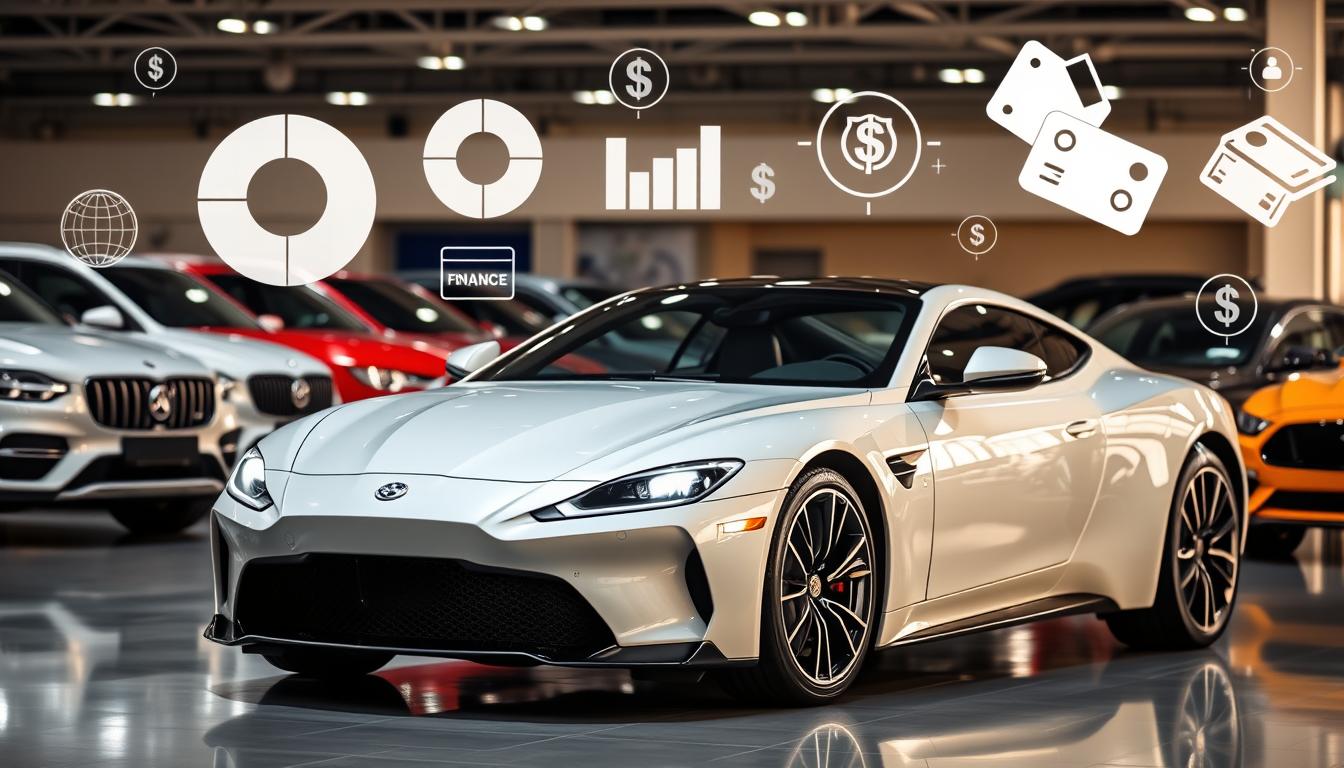Personal Contract Purchase (PCP) is a flexible car financing option. It offers lower monthly payments than traditional loans or hire purchase agreements. You don’t pay off the full value of the vehicle with PCP. Instead, it splits the car’s price into three parts: a deposit, monthly payments, and an optional final payment.
This loan is secured against the car. If you can’t keep up with repayments, the vehicle might be repossessed. PCP is becoming more popular in the UK, with1 82% of personal new car finance deals in 2016 being PCPs.
Unlike traditional car loans, PCP finance is based on the car’s depreciation. Your monthly payments are lower because you’re only paying for the vehicle’s loss in value. The contract term usually lasts between three to five years2.
At the end of the agreement, you have options. You can make a final ‘balloon’ payment to own the car outright. Or, you can return the vehicle or trade it in and use any equity towards a new PCP deal.
Understanding Car Finance Personal Contract Purchase
Personal Contract Purchase (PCP) is a common car finance choice. It’s different from traditional car loans, known as Hire Purchase (HP)3. PCP deals are more popular, needing a smaller deposit and lower monthly payments than HP3.
HP deals, however, have higher initial deposits and monthly payments than PCP3.
Key Features of PCP Finance
PCP lets you trade in the car for a new one regularly3. This flexibility is not found in HP, where you own the car at the end without a big final payment3. But, PCP deals have more terms and conditions, like mileage limits and damage charges, not seen in HP3.
How PCP Differs from Traditional Car Loans
The main difference is the balloon payment at the end of PCP. This payment lets you own the car or return it to the dealer3. PCP deals are for newer cars3. Both PCP and HP require credit checks, like traditional loans3.
Benefits and Limitations of PCP
PCP’s benefits include driving a newer car with less upfront money and building equity. This is not a feature of HP deals3. But, PCP has mileage restrictions and wear and tear charges3.
HP deals might be better for those who keep cars long or want to own them outright. They don’t have the same limitations as PCP3.
Understanding PCP and traditional car loans is key to choosing the right finance option345.
How PCP Finance Agreements Work
Personal Contract Purchase (PCP) is a common car finance option in the UK, with 80% of buyers choosing it6. It breaks down into three parts: an initial deposit, monthly payments, and a final balloon payment. This makes it easy to manage costs.
The finance company estimates the car’s depreciation over 24 to 36 months6. The loan amount is based on this estimate minus the deposit. Monthly payments cover the interest on the loan, including the balloon payment.
When the agreement ends, you have three options: pay the balloon to keep the car, return it, or use it as a deposit for a new car7. About 80% of people return their car for a new deal, while 20% pay off the balloon to own it6.
PCP deals have APR rates from 5% to 21% for used cars, with typical rates around 5.5% and 14.9%6. The deposit contribution from manufacturers can be £500 to £2,000 or more6.
Personal car loans last 1-7 years, with lower interest rates but need a good credit score6. Hire purchase, used by 20% of new buyers and more in the used market, gives full ownership but costs more than PCP6. Leasing, mainly for businesses, involves mileage and damage costs and may need gap insurance6.
The PCP process is flexible and offers many options for car ownership, making it a favourite among UK buyers76.
The Three Main Components of PCP
When you look at Personal Contract Purchase (PCP) for car finance, there are three main parts to get. These are the initial deposit, the monthly payments, and the final balloon payment8.
Initial Deposit Requirements
The initial deposit for a PCP deal is usually about 10% of the car’s price8. This payment upfront can cut down the total finance costs. It also makes the monthly payments smaller.
Monthly Payment Structure
PCP has lower monthly payments than traditional finance. This is because you only pay for the car’s depreciation, not its full price8. This makes PCP great for keeping your monthly car costs down.
Balloon Payment Explained
The balloon payment, or Guaranteed Minimum Future Value (GMFV), is set at the start of the PCP deal8. It’s the expected car value at the end of the agreement. You can choose to buy the car, return it, or use the equity as a deposit for a new car.
| Finance Option | Initial Deposit | Monthly Payments | Final Payment |
|---|---|---|---|
| Personal Contract Purchase (PCP) | Typically around 10% of the car’s price | Lower than traditional finance options | Balloon payment (Guaranteed Minimum Future Value) |
| Personal Loan (PL) | Smaller deposits | Potentially higher than other finance options | No final balloon payment |
| Hire Purchase (HP) | Initial deposit | Higher than PCP | No final balloon payment |
| Personal Contract Hire (PCH) | Initial rental payment | Fixed monthly payments | Return the vehicle at the end of the contract |

Factors Affecting Your Monthly PCP Payments
When you look at a Personal Contract Purchase (PCP) car finance deal, many things can change your monthly payments. The car’s car depreciation rate is key, as cars that keep their value better cost less each month9. Your initial deposit, the contract length, and agreed mileage limits also matter a lot9.
A bigger deposit, a longer contract, or fewer miles can lower your monthly payments9. But, going over the agreed mileage can lead to extra APR charges9.
The Annual Percentage Rate (APR) on your PCP deal is also vital, with lower APRs meaning smaller monthly costs9. In the UK, as of 2023, APRs for PCP deals range from 4% to 7%10. Your monthly payments are based on the car’s expected depreciation over the contract period, spread over the contract’s months10.
Think carefully about your lifestyle, income, and finances when choosing a PCP deal, as the monthly payments can be big10. Missing or late payments can hurt your credit score and cause long-term money problems10.
At the end of your PCP contract, you can choose to pay the balloon payment to keep the car, return it without paying the balloon, or swap it for a new one9. It’s important to think about your equity, the car’s market value, your preferences, future plans, and finances to decide the best option for you10.
Requirements and Documentation for PCP Finance
Essential Documentation Needed
To apply for PCP car finance, you need to gather some important documents. You’ll need personal details, a valid driving licence11, and proof of income like recent payslips or bank statements11. You might also have to share your address history for the last three years12.
Car finance companies usually ask for original documents, not photocopies or scans12.
Eligibility Criteria
The rules for PCP finance vary by provider, but some things are common. You must be at least 18 and have a UK address11. Lenders might check your address history if you’ve recently moved or returned to the UK11.
Young adults or those with limited credit history might need a guarantor for their application13.
Credit Score Considerations
Your credit score is key when applying for PCP finance. A good score can lead to better terms, while a poor score might make it harder12. But, there are lenders who help those with bad credit11.
Having accurate documents and a strong credit score can really help your application.
FAQ
What is Personal Contract Purchase (PCP) in car finance?
Personal Contract Purchase (PCP) is a flexible car finance option. It offers lower monthly payments than traditional loans. You pay a deposit, monthly payments, and an optional final payment.
How does PCP finance differ from traditional car loans?
PCP finance has lower monthly payments and a balloon payment at the end. It’s more flexible than traditional hire purchase. You pay less each month but a larger final payment.
What are the benefits and limitations of PCP?
PCP lets you drive a newer car for less money upfront. But, it has mileage limits and wear and tear charges.
How do PCP finance agreements work?
PCP agreements split the car’s cost into three parts. You pay a deposit, monthly payments, and a final balloon payment. The finance company predicts the car’s value drop over the term.
What are the three main components of a PCP agreement?
A PCP agreement has three parts. The initial deposit, monthly payments, and the balloon payment. The deposit is usually 10% of the car’s price.
What factors affect the monthly payments for a PCP agreement?
Monthly payments are influenced by several factors. These include the car’s depreciation rate and the initial deposit. The contract length, agreed mileage, and APR also matter.
What documentation is required to apply for PCP finance?
To apply for PCP finance, you need personal details and employment history. Bank information is also required. You’ll need a driver’s licence, proof of address, and income proof. Your credit score and eligibility are important too.

















